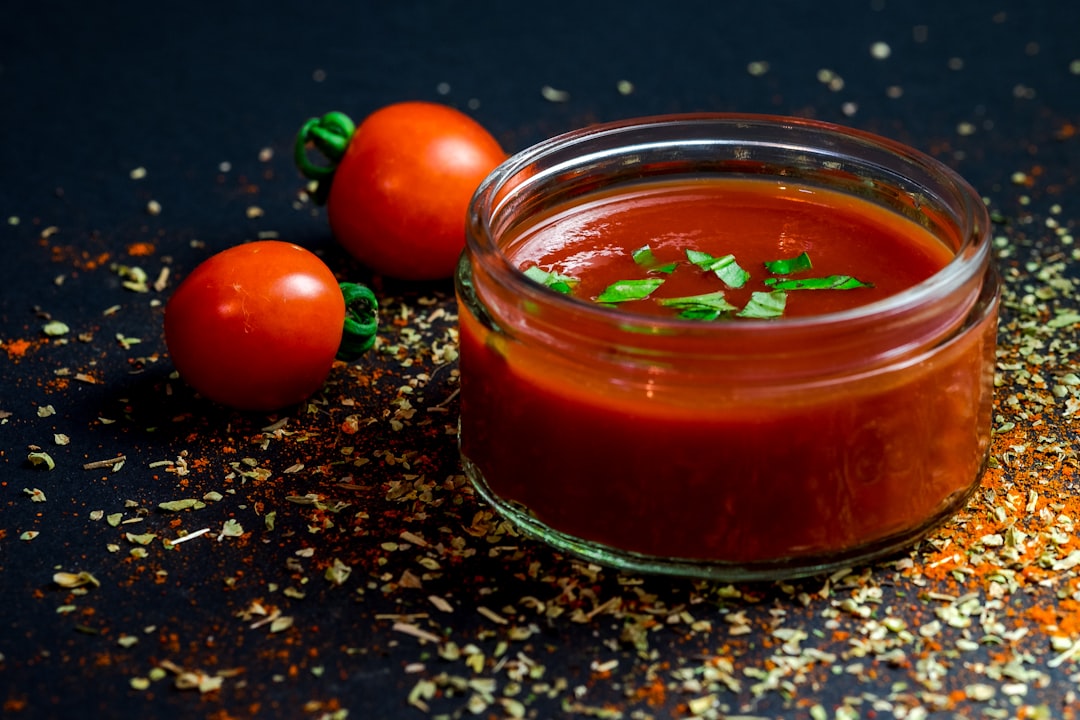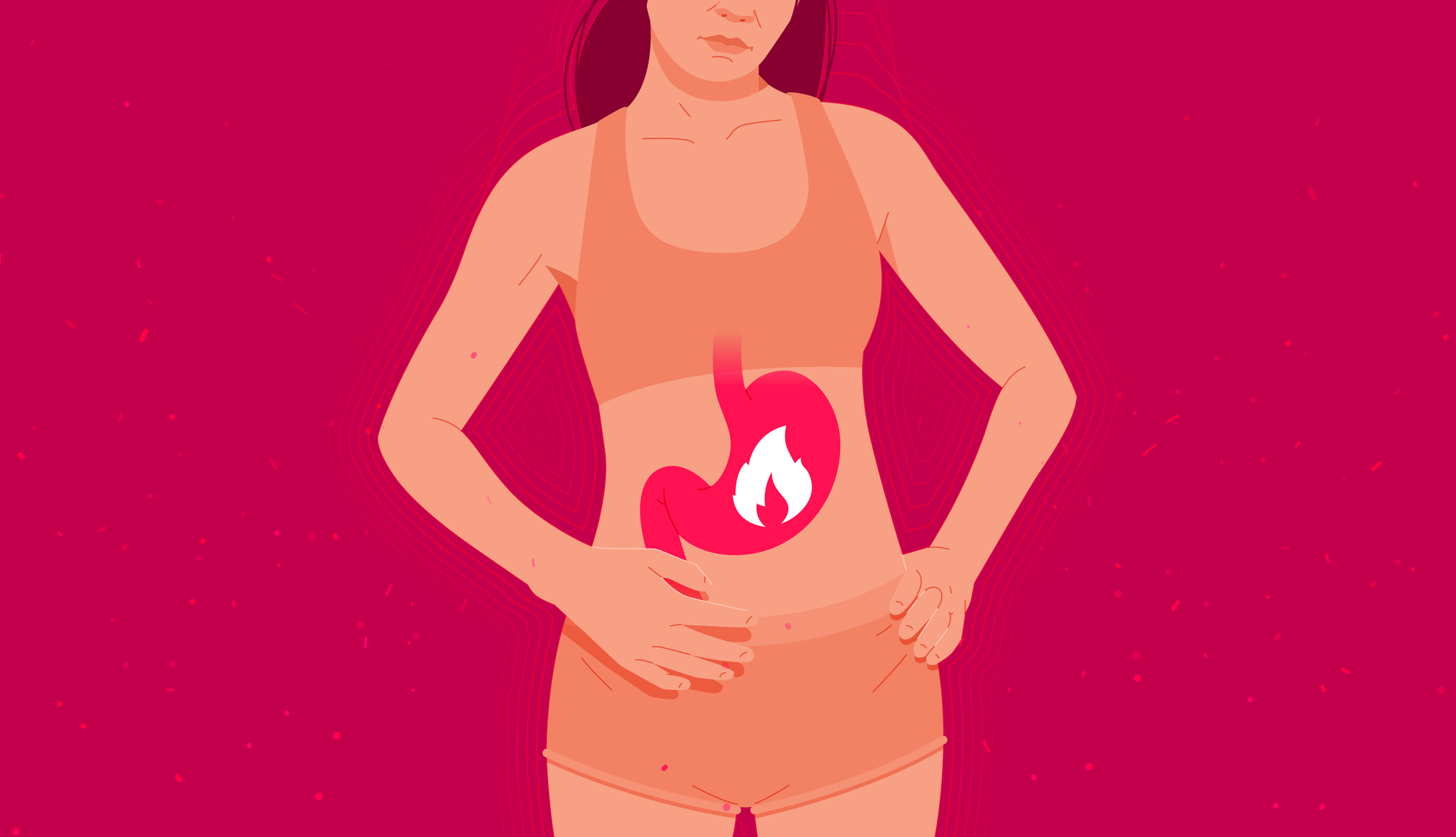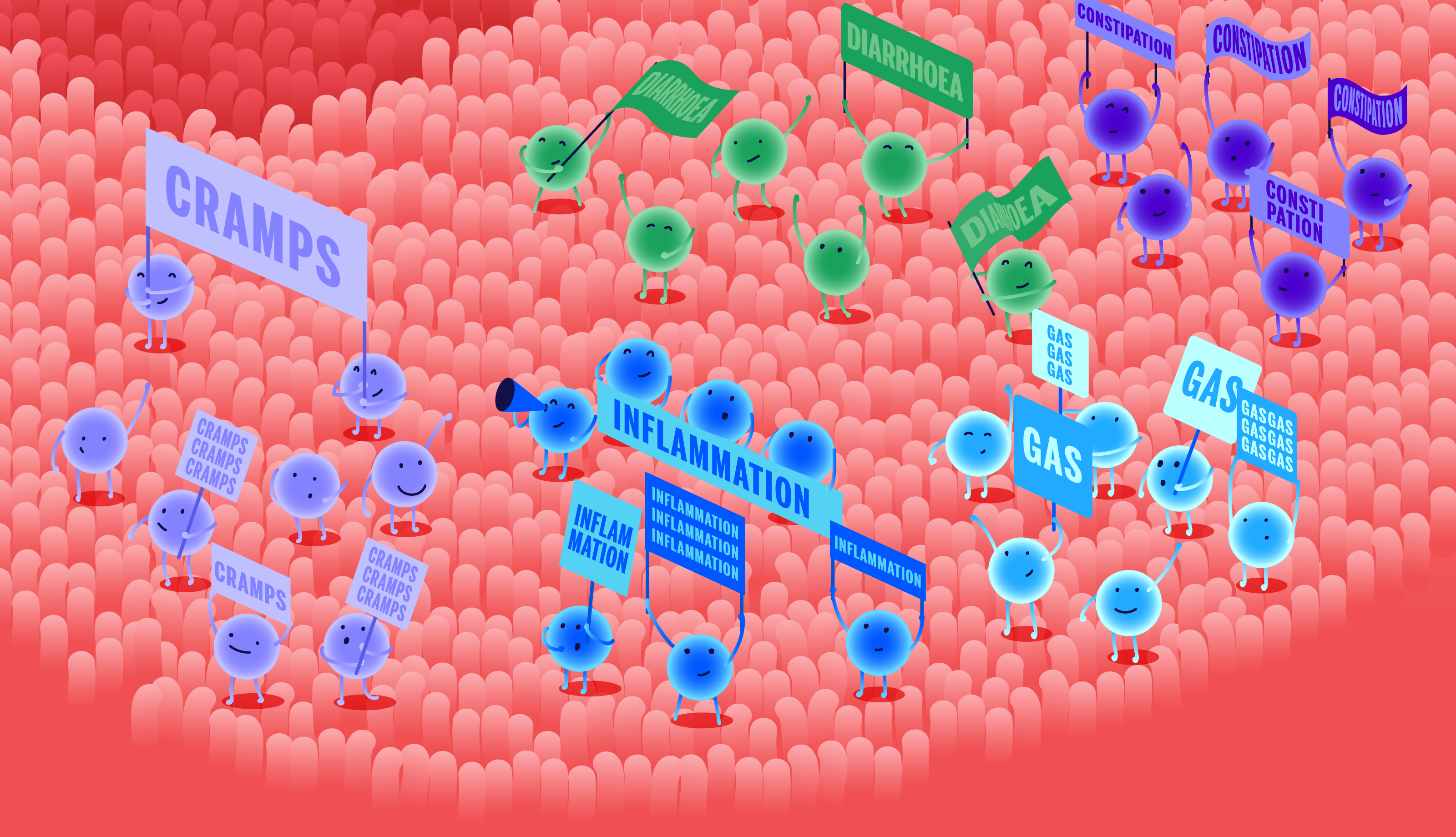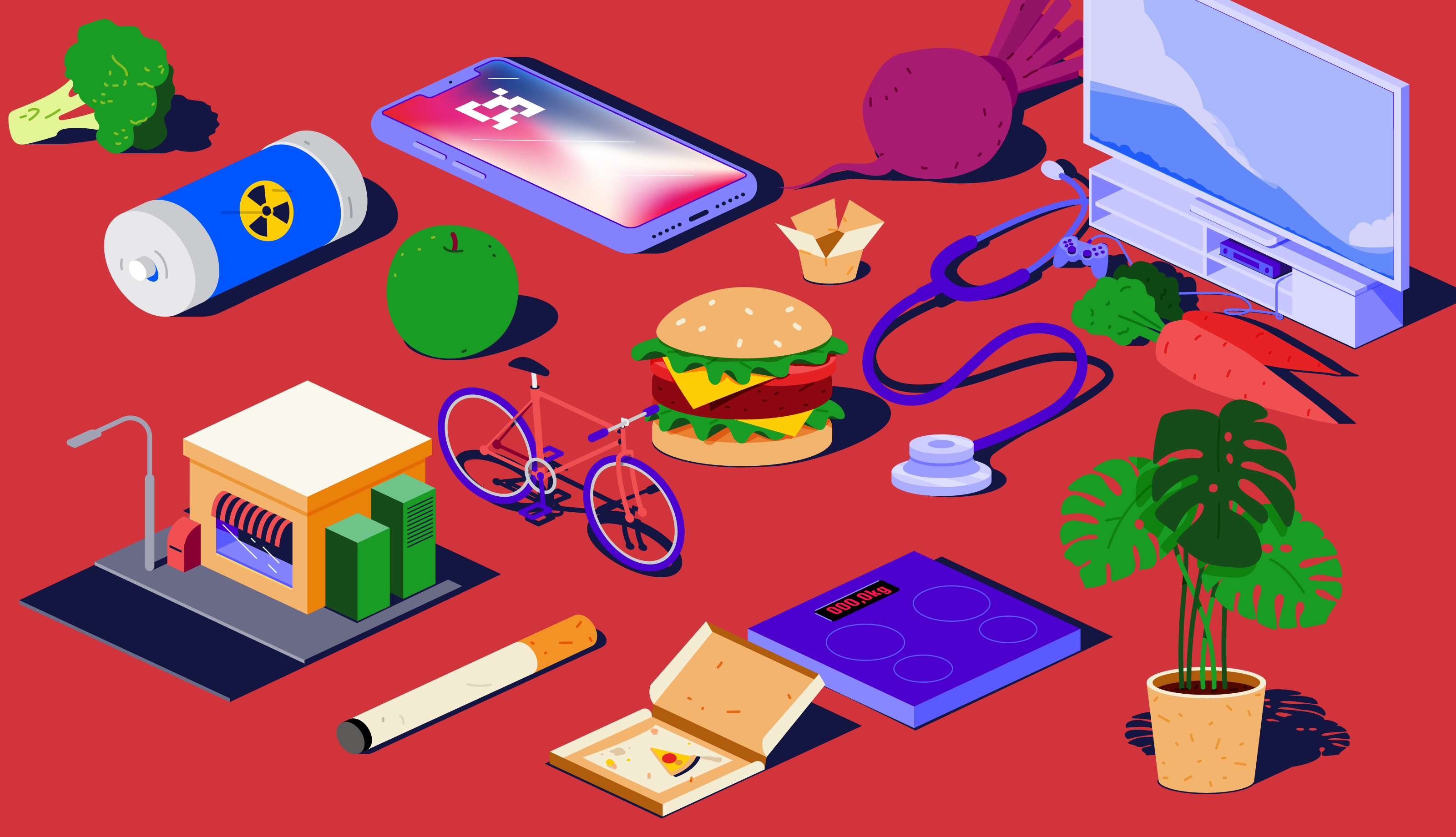If you're reaching for antacids to treat heartburn, you’re not alone. Acid reflux is a common problem, here's how to manage it with lifestyle changes.
If you’ve ever experienced that uncomfortable burning pain in your chest, hiccupping, or a hoarse voice, especially after you’ve eaten, then you already know what acid reflux is. It’s a common condition and it affects up to a quarter of UK adults.
Table of contents
- Why is there too much acid in my stomach?
- What causes reflux?
- What is acid reflux disease?
- What is the treatment for acid reflux?
- How to reduce stomach acid at home
- Acidic tummy: things to remember
Acid reflux occurs when stomach acid travels back up into the oesophagus, resulting in a burning sensation, but it can even affect breathing too. Most people experience it at some point in their lives, but if it keeps occurring, it has a special name: gastroesophageal reflux disease or GERD for short.
Why is there too much acid in my stomach?
Your stomach has a nifty way of digesting proteins and it’s called stomach acid, though you might know it as gastric juice or simply acid. It mainly consists of hydrochloric acid, a potent chemical produced by the cells lining the stomach (parietal cells) and your gastric glands.
As its name suggests, it can burn, so your body keeps it encased within your stomach that is designed to withstand its extreme acidity. Sometimes this mechanism fails, and the acid is pushed up into your oesophagus (or gullet), the muscular tube which joins your mouth to your stomach.
Where your oesophagus meets your stomach, there is a special muscular valve called the esophageal sphincter which ensures one-way flow from the gullet to the stomach. When you eat, it opens to let food pass into your stomach, but for the rest of the time, it should remain tightly shut so the contents of your stomach don’t pop back up.
If, however, this valve fails to do its job (temporarily or permanently), then your stomach contents (food and gastric juices) are regurgitated back up into your oesophagus. This is acid reflux, and it causes heartburn, but if it’s severe and prolonged, the acid can cause inflammation in your gullet, and very sore ulcers.
Contrary to popular belief, acid reflux disease is not caused by too much stomach acid rather it’s the result of acid going to the wrong place. Lifestyle can actually influence heartburn because research shows that fried food, alcohol, smoking, and lack of exercise are involved. But these are not the only causes, there are some you just can’t prevent.
☝FACT☝ What acid is in the stomach? Hydrochloric acid. On average, an adult stomach produces around 1.5 litres of gastric acid every day.
What causes reflux?
If the contents of your stomach escape and head back up your oesophagus, you’ll experience some uncomfortable gastric reflux symptoms.This painful burning sensation in your lower chest can be unpleasant, and even downright painful.
High stomach acid symptoms in the gullet
- heartburn
- sour taste in your mouth
- bad breath
- recurrent cough or hiccups
- hoarse voice
- bloating
- nausea
In particular, specific lifestyle factors can increase the risk of heartburn and acid reflux. The good news is that many of these are preventable (even if they may not always be desirable). Case-in-point, smoking is a very hard habit to kick, but if you get reflux from heavy meals and drinking too much, then it might simply mean curbing your intake and consuming in moderation.
What can cause acid reflux?
- weight gain and obesity
- smoking
- physical inactivity
- drinking too much alcohol
- eating large meals before bed
- some medications
- bending over or stooping forwards
- lying flat
Interestingly, pregnant women are more susceptible to acid reflux, particularly in the later stages because the baby begins to push upwards onto the stomach. Let’s face it, there’s not much room in there! Thankfully though, it usually goes away once the baby is born, although some women experience heartburn for a little while after.
Stomach acid reflux and your diet

The increasing prevalence of the condition in the western world means that dietary habits could be a potential cause. Plus, there is increasing evidence that lifestyle is a major cause for concern. But identifying the food or drinks causing your acid reflux means you can prevent it in the future by avoiding these triggers.
| Food | Beverages |
|---|---|
| citrus fruits | fruit juice |
| tomatoes | alcohol |
| chocolate | coffee |
| greasy foods | carbonated drinks |
What is acid reflux disease?
If it doesn’t happen often, you might be able to manage it with lifestyle changes, but if it’s a chronic problem that doesn’t respond to these changes, you could have gastro-esophageal reflux disease, or GERD.
GERD is diagnosed when heartburn occurs on a regular basis, usually at least twice per week. It often begins after eating, especially spicy or fatty food, or drinking alcohol. Although heartburn is a typical sign, there are some other uncomfortable symptoms.
Severe GERD symptoms
- difficulty or painful swallowing
- chest pain
- burping
- hiccups
- nausea
- vomiting
- sore throat
- feeling like there is a lump in your throat
- acidic taste or acid throat
☝FACT☝Can acid reflux cause stomach pain? When gastric acid irritates the stomach lining, it’s called gastritis. Gastritis and acid reflux are sometimes known as hyperacidity.
Acid-reflux disease and gut dysbiosis
Your colon houses a unique ecosystem consisting of trillions of bacterial cells which, in return for a place to stay and some sustenance, carry out important health-benefiting functions. A balanced microbiome is what you need to keep your gut and the rest of your body healthy.
The mechanism linking the two isn’t fully understood yet. It’s not clear whether changes in the gut flora cause the condition, or whether changes in the oesophageal environment lead to changes in the composition of the gut microbiota.
Hiatal hernia: a medical cause of acid reflux
A hiatal hernia is a common cause of acid reflux, particularly as you get older. It happens when a small part of your stomach pushes up into your chest. The root cause isn’t known, but it is attributed to weakened muscle tissue around the diaphragm for a variety of reasons, a flat muscle in the chest which helps with the breathing mechanism.

Unfortunately, there is nothing you can do to prevent a hiatus hernia forming. It is more common in people over 50 years of age. The symptoms are the same as acid reflux symptoms in adults, and there are treatments available which you can discuss with a doctor.
Obesity, high-fat diets, and acid reflux
The rise in obesity across the western world is thought to be a leading reason for an increase in the prevalence of diseases of the oesophagus. The rise in both conditions is associated with an increase in the consumption of high-fat diets.
In addition to dietary considerations, carrying too much weight around your body can cause physical problems associated with gastroesophageal reflux. People suffering from obesity are more likely to have a hiatal hernia, which allows stomach acid to access the gullet. But the extra weight also puts pressure on the stomach, which can force gastric juices upwards, even without a hernia.
☝TIP☝ You can check your protection from obesity and gut bacteria health with the Atlas DNA and Microbiome Tests.
What is the treatment for acid reflux?
There are treatments available specifically for treating acid reflux, what you’ll need will depend on the severity and what’s causing the problem. If you have chronic heartburn, it’s essential to ask your doctor because acid reflux can cause severe damage to your oesophagus if left untreated.
If the problem is chronic or severe, a doctor can prescribe medications which inhibit the production of gastric juices for acid reflux relief and prevent the damage it causes. The medications often prescribed are proton pump inhibitors (PPIs) or H2 blockers.
☝FACT☝ Acid reflux medications, even over the counter ones, change stomach acidity, and this can have consequences on your digestive health.
Treatments for acid reflux
| Acid reflux treatment | Examples | How they work |
|---|---|---|
| Antacids | Calcium carbonates, sodium bicarbonate, magnesium hydroxide | These provide short term relief by neutralising the acid of the stomach. They prevent damage caused by acid reflux. |
| Alginates | Compounds containing structural polysaccharides from algae | These contain an antacid which neutralises stomach acid. It also contains alginic acid which forms a gel on top of the stomach contents to stop it returning back up the gullet. |
| Proton pump inhibitors (PPIs) | Omeprazole, esomeprazole, lansoprazole | Long-lasting reduction of stomach acid production that prevents oesophageal damage due to chronic reflux. |
| Histamine H2 receptor agonists (H2 blockers) | cimetidine, ranitidine, famotidine | These act on the cells which produce stomach acid and stop excessive stomach acid production. They can reduce acid secretions by 70 percent over 24 hours. |
Surgery is usually reserved for very severe cases of valve dysfunction if GERD doesn’t respond to treatment or lifestyle changes. However, making some changes to your lifestyle can help to effectively reduce or prevent the symptoms of acid reflux.
☝FACT☝PPIs can change the composition of the gut microbiota which can lead to a less healthy microbiome.
How to reduce stomach acid at home
Sadly, lifestyle choices are often the cause of acid reflux in the western world. And it’s not just food habits that can add to the problem, poor sleep quality and smoking are also linked with acid reflux and GERD. Fortunately, there are things you can actively do to keep the dreaded burn at bay.
Look at your diet
Diet is a major contributing factor to the onset of acid reflux and GERD. Fibre, however, could be a saviour. For example, a low fibre intake is linked with reduced motility and delayed emptying of your stomach, both of which can increase the likelihood of reflux.

A 2018 study found that increasing fibre intake reduces heartburn frequency and pressure on the esophageal sphincter. Plus, your gut bacteria love dietary fibre because it provides them with energy to carry out vital health functions and keep your gut microbiome balanced and diverse.
Try gentle exercise
Exercise is a double-edged sword when it comes to acid reflux. The intensity of the activity is key, because vigorous exercise can make heartburn worse. So too can exercises that require you to lie flat and use your core muscles. Plus, energy and sports drinks are acidic and can cause reflux.
However, light physical activity such as walking, cycling, or a gentle jog are perfect. In fact, taking a walk after a meal can help your body move food out of the stomach, thus reducing pressure on your upper stomach valve and, the risk of heartburn. That’s why taking a walk after Christmas dinner is a tradition – to keep your digestive tract moving!
Weight loss works
Weight gain during adulthood has been identified as a major risk factor for acid reflux. That’s because it puts extra pressure on the junction where the oesophagus meets the stomach. Research shows that the risk of GERD increases with higher body mass index (BMI).
However, weight loss can seriously help to reduce acid reflux symptoms. In fact, in one study, overweight and obese individuals with GERD symptoms who participated in a structured weight loss programme saw a complete resolution of their symptoms.
Other factors
There are other lifestyle factors which can increase your risk of acid reflux disease. For example, cutting down your alcohol consumption, giving up smoking, and getting a good night’s sleep can also reduce risk of heartburn and other associated symptoms.

The timing of your eating patterns is also important. Eating a few hours before going to bed or eating a midnight snack is not good for your oesophagus, or your gut for that matter. Oh, and don’t skip breakfast, it’s the best meal of the day, and can keep the acid exactly where it needs to be, in your stomach!
Acidic tummy: things to remember
Acid reflux disease is a common condition and is on the rise in the western world, alongside diseases such as obesity and diabetes. This is largely due to the western diet which has poor nutritious quality and sedentary lifestyles. But there are things you can do to reduce the risk of acid reflux disrupting your life. Just remember:
- Acid reflux is not caused by too much stomach acid.
- Acid reflux happens when stomach acid travels back into your oesophagus.
- If it happens more than twice a week, it’s gastroesophageal disease (GERD).
- Extra weight on your waist is linked to acid reflux.
- Your lifestyle can help prevent or encourage acid reflux.
- There could be a link between the condition and gut dysbiosis.
- Ask your doctor about heartburn, it’s a proper medical problem.
- Surgery is a last resort in many cases of GERD.
- A fibre-rich diet, gentle exercise, quitting smoking, and weight loss can help.
- Domingues, G et al. Refractory Heartburn: A Challenging Problem in Clinical Practice, 2018
- Anand G and Katz P.O., Gastroesophageal Reflux Disease and Obesity, 2010
- Hatlebakk, J, G et al. Gastroesophageal Acid Reflux Control 5 Years After Antireflux Surgery, Compared with Long-Term Esomeprazole Therapy, 2016
- Informed Health. Org. How Does the Stomach Work?, 2009
- Kahrilas, P, J. Gastroesophageal Reflux Review, 2014
- Moreira, A et al. Influence of Exercise Testing in Gastroesophageal Reflux in Patients with Gastroesophageal Reflux Disease, 2014
- National Health Service. Heartburn and Acid Reflux, 2017
- Okereke, I et al. Associations of the Microbiome and Esophageal Disease, 2019
- Richter, J, E and Rubenstein, J, H. Presentation of Epidemiology of Gastroesophageal Reflux Disease, 2018
- Sachs, G et al. Review Article: The Clinical Pharmacology of Proton Pump Inhibitors, 2006
- Sethi, S and Richter, J, E. Diet and Gastroesophageal Reflux Disease: Role in Pathogenesis and Management, 2017
- Singh, M et al. Weight Loss Can Lead to Resolution of Gastroesophageal Reflux Disease Symptoms: A Prospective Intervention Trial, 2014
- Yamamichi, N et al. Lifestyle Factors Affecting Gastroesophageal Reflux Disease Symptoms: A Cross-Sectional Study of Healthy 19864 Adults Using FSSG Scores, 2012


















